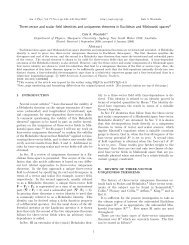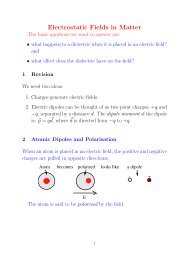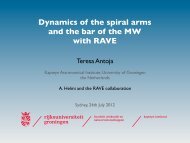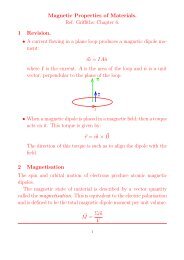<strong>Chapter</strong> 8 <strong>Vector</strong> <strong>Spaces</strong> <strong>in</strong> <strong>Quantum</strong> <strong>Mechanics</strong> 106In the limit of L → ∞, this then becomes12π∫ +∞−∞e ik(x−x 0) dk = δ(x − x 0 ). (8.93)The delta function is not to be thought of as a function as it is usually def<strong>in</strong>ed <strong>in</strong> puremathematics, but rather it is to be understood that a limit of the k<strong>in</strong>d outl<strong>in</strong>ed above isimplied whenever the delta function appears <strong>in</strong> an <strong>in</strong>tegral 3 . However, such mathematicalniceties do not normally need to be a source of concern <strong>in</strong> most <strong>in</strong>stances. It is usuallysufficient to be aware of the basic property Eq. (8.84) and a few other rules that can beproven us<strong>in</strong>g the limit<strong>in</strong>g process, such as∫ +∞−∞∫ +∞−∞δ(x) = δ(−x)δ(ax) = 1|a| δ(x)xδ(x) = 0δ(x − x 0 )δ(x − x 1 ) = δ(x 0 − x 1 )f (x)δ ′ (x − x 0 )dx = − f ′ (x 0 ).The limit<strong>in</strong>g process should be employed if there is some doubt about any result obta<strong>in</strong>ed.For <strong>in</strong>stance, it can be shown that the square of a delta function cannot be given a satisfactorymean<strong>in</strong>g.Delta Function NormalizationReturn<strong>in</strong>g to the resultψ(x ′ ) =∫ +∞−∞〈x ′ |x〉ψ(x)dx (8.94)we see that the <strong>in</strong>ner product 〈x ′ |x〉, must be <strong>in</strong>terpreted as a delta function:〈x ′ |x〉 = δ(x − x ′ ). (8.95)The states |x〉 are said to be delta function normalized, <strong>in</strong> contrast to the orthonormalproperty of discrete basis states. One result of this, as has been po<strong>in</strong>ted out earlier, is thatstates such as |x〉 are of <strong>in</strong>f<strong>in</strong>ite norm and so cannot be normalized to unity. Such statesstates cannot represent possible physical states of a system, though it is often convenient,with caution, to speak of such states as if they were physically realizable. Mathematical(and physical) paradoxes can arise if care is not taken. However, l<strong>in</strong>ear comb<strong>in</strong>ationsof these states can be normalized to unity, as this follow<strong>in</strong>g example illustrates. If weconsider a state |ψ〉 given by|ψ〉 =∫ +∞−∞|x〉〈x|ψ〉dx, (8.96)3 This raises the question as to whether or not it would matter what representation of the delta function isused. Provided the function f (x) is bounded over (−∞, +∞) there should be no problem, but if the functionf (x) is unbounded over this <strong>in</strong>terval, e.g. f (x) = exp(x 2 ), then only the rectangular representation of thedelta function will give a sensible answer.
<strong>Chapter</strong> 8 <strong>Vector</strong> <strong>Spaces</strong> <strong>in</strong> <strong>Quantum</strong> <strong>Mechanics</strong> 107then〈ψ|ψ〉 =∫ +∞But 〈x|ψ〉 = ψ(x) and 〈ψ|x〉 = ψ(x) ∗ , so that〈ψ|ψ〉 =−∞∫ ∞−∞〈ψ|x〉〈x|ψ〉dx. (8.97)|ψ(x)| 2 dx. (8.98)Provided |ψ(x)| 2 is a well behaved function, <strong>in</strong> particular that it vanish as x → ±∞, this<strong>in</strong>tegral will converge to a f<strong>in</strong>ite result, so that the state |ψ〉 can <strong>in</strong>deed be normalized tounity, and if so, then we can <strong>in</strong>terpret |ψ(x)| 2 dx as the probability of f<strong>in</strong>d<strong>in</strong>g the particle <strong>in</strong>the region (x, x + dx), which is just the standard Born <strong>in</strong>terpretation of the wave function.8.6.4 Separable State <strong>Spaces</strong>We have seen that state spaces of <strong>in</strong>f<strong>in</strong>ite dimension can be set up with either a denumerably<strong>in</strong>f<strong>in</strong>ite number of basis states, i.e. the basis states are discrete but <strong>in</strong>f<strong>in</strong>ite <strong>in</strong> number,or else a non-denumerably <strong>in</strong>f<strong>in</strong>ite number of basis states, i.e. the basis states are labelledby a cont<strong>in</strong>uous parameter. S<strong>in</strong>ce a state space can be spanned by more than one set ofbasis states, it is worthwhile <strong>in</strong>vestigat<strong>in</strong>g whether or not a space of <strong>in</strong>f<strong>in</strong>ite dimensioncan be spanned by a set of denumerable basis states, as well as a set of non-denumerablebasis states. An example of where this is the case was given earlier, that of a particle<strong>in</strong> an <strong>in</strong>f<strong>in</strong>itely deep potential well, see p95. It transpires that not all vector spaces of<strong>in</strong>f<strong>in</strong>ite dimension have this property, i.e. that they can have both a denumerable and anon-denumerable set of basis states. <strong>Vector</strong> spaces which can have both k<strong>in</strong>ds of basisstates are said to be separable, and <strong>in</strong> quantum mechanics it is assumed that state spacesare separable.8.7 States of Macroscopic SystemsIn the examples given above, it was assumed that an exhaustive list of results that couldbe obta<strong>in</strong>ed <strong>in</strong> the measurement of some observable of a quantum system could be usedto set up the basis states for the state space of the system. The value of do<strong>in</strong>g this is,of course, to be determ<strong>in</strong>e by the success or otherwise of these ideas. That quantummechanics is such an overwhelm<strong>in</strong>gly successful theory <strong>in</strong>dicates that there is someth<strong>in</strong>gcorrect <strong>in</strong> this procedure, but the question that arises is this: why does it not appear towork for macroscopic systems, i.e. for systems which we know can be fully adequatelyexpla<strong>in</strong>ed by standard classical physics? The answer appears to lie <strong>in</strong> the fact that <strong>in</strong>all the examples discussed above, whether or not the Hilbert space is of f<strong>in</strong>ite or <strong>in</strong>f<strong>in</strong>itedimension, i.e. whether or not we are talk<strong>in</strong>g about sp<strong>in</strong> up or sp<strong>in</strong> down of a sp<strong>in</strong> halfparticle, or the position of a particle <strong>in</strong> space, the implicit assumption is that the system weare consider<strong>in</strong>g is totally isolated from all other systems, <strong>in</strong> particular from any <strong>in</strong>fluenceof the surround<strong>in</strong>g environment. After all, when we talked about a system, such as anO − 2ion, we are ignor<strong>in</strong>g all the other physical <strong>in</strong>fluences that could act on this system,i.e. we do not need to mention, <strong>in</strong> our specification of the state of the system, anyth<strong>in</strong>gother than properties that directly perta<strong>in</strong> to the system of <strong>in</strong>terest. The assumption is
















